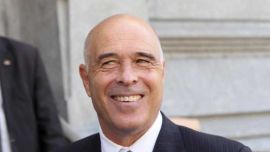This was never going to be an easy week for Vice-President Cristina Fernández de Kirchner. Tuesday (October 27) marked the 10th anniversary of the sudden death of her late husband, former president Néstor Kirchner, from a heart attack.
Remembering the departed leader was straightforward enough for the authorities. President Alberto Fernández, who served as Kirchner’s Cabinet chief during his 2003-2007 presidency, lead a ceremony to mark the date at the grand former Post Office building, now a cultural centre that carries the late president’s name.
Fernández delivered a speech at the feet of a statue of the former president, which had been rescued from Ecuador (where it had been removed from the grounds of the former headquarters of the Unasur, when the government changed). Fernández de Kirchner did not attend, which is not a surprise considering the emotional stress of the day. What did raise eyebrows – and unleashed a wave of speculation about the state of the ruling centre-left coalition – was a letter released by her on the eve of the anniversary.
The vice-president, the leader of the powerful Kirchnerite wing of the ruling coalition, has for a long time shunned any direct contact with the mainstream press, complaining that what she says is constantly manipulated with malice. Instead, Fernández de Kirchner has opted for generally releasing lengthy public statements and videos on social media when she has something to say. Monday's letter prompted multiple readings. The vice-president admitted that the pandemic had a “stifling” effect on the economy, while calling for a sweeping political agreement (including business leaders and media companies) to tackle what she described as Argentina's biggest problem: its “bi-monetary” economy where the dollar reigns supreme.
At face value CFK's statement was packed with support for the president. And the Cabinet? Not so much. What made the missive particularly awkward was that Fernández de Kirchner, in a passing remark, said the government had “functionaries that don't function.” It's the first public statement that appears to confirm speculation that she is unhappy with the executive performance of many top-level government officials (especially those who belong to the president's inner circle) and that she would like to see a reshuffle.
The Cabinet tried to take the letter in its stride. But on Tuesday, reports said that Fernández had huddled with Lower House Speaker Sergio Massa. Both the president and the Frente Renovador leader formally bolted Kirchnerismo in 2009 and became fiercely critical of Fernández de Kirchner during her second 2011-2015 term. Read between the lines and CFK's words of support for the president were also telling the nation that ultimately Alberto is the boss and that he should be held responsible for the current situation (an economy crippled by the pandemic amid pressure for a massive devaluation of the peso) – and whatever happens next.
Over 30,000 coronavirus deaths have now been reported in Argentina. The opposition blames the lockdown measures first announced by Fernández on March 20 for the economic malaise, which includes a dollar deposit drain and bleeding Central Bank foreign currency reserves. (Hence CFK's call for an agreement with the opposition, business leaders and the media). The president counters that the pandemic has ravaged economies the world over.
Elisa Carrió, a key member of the centre-right opposition coalition, said the vice-presidential intervention had the whiff of a palace coup. CFK was withdrawing her support, Carrió charged. The critic’s party, the Coalición Cívica, is now all of a sudden offering support for the president by backing the nomination of Daniel Rafecas as attorney general. Carrió argues that Rafecas should be backed because he has opposed a move by the ruling coalition to lower the number of votes required in the Senate for a nomination to be approved. Backing Rafecas is a way of blocking CFK’s drive for supremacy in the Senate, Carrió said.
You can hear the ruling coalition creaking amid the pandemic. Still, the opposition coalition has its own internal differences to worry about too. Carrió unabashedly said in a television interview this week that former centre-right president Mauricio Macri is history. Effectively this could imply that Carrió is now siding with the moderate wing of Juntos por el Cambio, headed by Buenos Aires City Mayor Horacio Rodríguez Larreta, a potential presidential candidate in 2003. Macri, who lost the election last year, has opted for a tougher stance on the lockdown: he has accused the Fernández administration of using the pandemic as an excuse to curtail civil liberties and shown his full support for the wave of hardline anti-government protests. Another flag-waving protest has been called for November 8. Government supporters say Macri, who does not perform well in polls and is now trying to ride the wave of protests, of coup-mongering.
The context in Argentina now is a state of constant agitation – it would be difficult to explain to an alien from outer space without a very long introduction. Police on Thursday forcefully evicted squatters occupying a plot of land in Greater Buenos Aires after weeks of negotiations. Left-wing groups that do not support the government immediately staged angry protests, which included roadblocks, against the eviction.
Farmland in Entre Ríos Province is also the subject of a similar controversy. A judge on Wednesday ruled that a militant group of squatters, lead by social leader Juan Grabois, must leave the Etchevehere family farm land that they are occupying. The group argued that they had the support of Dolores Etchevehere, one of the family members, who said she had donated the land to them. The situation prompted a fierce protest by hundreds of outraged farmers outside the property, headed by Luis Miguel Etchevehere (Macri's former agriculture minister), against his sister. Before Wednesday's new court ruling ordering police action to deal with the militant group inside the farm, the president had said the conflict was a feud in a rich family that should be settled in court.
Opposition leaders said the row in Entre Ríos (still raging at press time for this column) is illustrative of the national government's persistent disregard for private property. Grabois is a government supporter. Critics have also expressed outrage at Grabois' purported contacts with Pope Francis. The local branch Catholic Church on Wednesday issued a statement condemning the occupation of land. Rodríguez Larreta, for all his moderation, also made a point of publicly defending private property.




















Comments